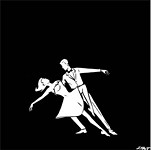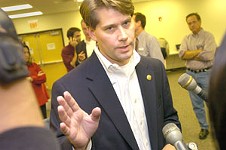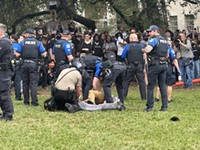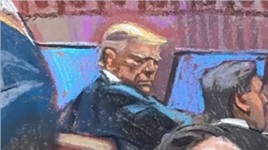Nader Does the Texas Two-Step
The newest presidential candidate meets his supporters – and detractors – in Austin
By Michael King, Fri., March 5, 2004
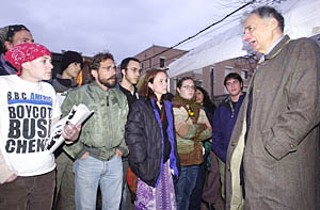
Ralph Nader barnstormed through Texas last week, with stops in Houston, San Antonio, Dallas, and a day prolonged in Austin; the UT Geology Building proved too small for the several hundred people wanting to hear the latest presidential candidate, so Nader obligingly delivered two speeches. Introduced by Brent Purdue, a UT student running an anti-corporate, anti-military research campaign for the Student Government president under the "Books Not Bombs" banner, Nader began, "This country does not belong to two parties."
Nader rang the changes on the anti-corporate duopoly theme he had sounded in when he entered the race a few days earlier, adding several blows against "the liberal intelligentsia" – the catchall term he's using for those left-leaning Democrats loudly denouncing his entry into the race as a boon to the candidacy of George W. Bush. He dismissed as "autocratic" the argument that his 2000 campaign on the Green Party ticket was the reason for Democrat Al Gore's defeat, recounting instead an "unending streak of defeats" by the Democrats "to the most extreme wing of the Republican Party." "If you can't beat Newt Gingrich and Tom DeLay," Nader declared, "you'd better pack it in and let somebody else take over."
Nader did acknowledge that he "would prefer the Democrats to win, because they're not as bad as the Republicans. Their grade is a D-plus, while the Republicans get a D-minus – but they're both flunking." He said the Clinton/Gore administration did little or nothing either to help working people or to protect the environment, and that the only response of Democrats to that charge has been, "Do you know how bad the Republicans are?" "A party that defines itself by the worst," said Nader, "will never bother to become the best."
Amid the largely approving audience during Nader's first talk were about a dozen sign-holding students from the University Democrats, who occasionally interrupted the applause with chants of "Ralph don't run!" The gist of Nader's historical argument ran like this: Since 1980, he said, both major parties have become increasingly beholden to corporate money to underwrite campaigns and sustain their organizations. Consequently, both parties have been steadily pulled toward policies that favor major corporate interests and the extremely wealthy. "But there's nobody pulling in the other direction," said Nader, "with the predictable consequence that both parties are getting worse every four years."
It's not clear how much "pull" Nader can generate in 2004. He's not formally seeking the Green Party nomination this year, though it's conceivable that a draft-Nader movement will gain some traction by late June, when the Green Party holds its convention in Milwaukee. (There are currently seven declared Green candidates for president, including the party's former Texas state organizer David Cobb and Californian Peter Camejo.) But the widely varying state ballot rules create additional obstacles. Nader is already on the ballot in some less restrictive states, but in Texas, for example, a candidate hoping to get on the ballot as an independent will need to acquire more than 64,000 valid signatures – from people who didn't vote in either major party primary – in the two months following the March 9 election. (The Green Party will likewise need to collect a daunting 45,000 signatures, in the 45 days following the primary, to be listed – with whatever candidate – on the Texas ballot.) Last week, organizers were still trying to confirm whether Texans signing a Nader petition could also legally sign a petition for the Greens (or any other third party). John St. Denis, chair of the Travis Co. Greens, said that he welcomes Nader's candidacy as "one more voice" for progressive issues, but that his own focus is on getting his party on the Texas ballot, and he is uncertain how that might affect a Nader campaign.
In addition to building public support with appearances here, Nader spent time trying to organize his Texas petition campaign. He met briefly with local activist Linda Curtis, president of Independent Texans, who says that while the group is unlikely to endorse any candidate, she will help Nader herself and encourage other members to do likewise when they meet at Huston-Tillotson College on March 7. (Independent Texans is affiliated with the New York-based Committee for a Unified Independent Party, the "nonprofit political center" that is the latest incarnation of Lenora Fulani and Fred Newman's controversial "social therapy" movement. Curtis insists that CUIP does not mix its psychology with its politics.)
Austin activist Debbie Russell, who helped Nader organize his Austin appearances, says the details of the Texas campaign are still being worked out. "I found that there is much more fear this year of a Bush re-election," said Russell, "even among hardcore activists who otherwise agree with Nader on the weaknesses of the two parties. Ninety percent were dead-set against [Nader running]." She said the Austin audiences helped draw Nader out more strongly on some of the issues, especially against the war in Iraq, but that garnering support locally remains an uphill fight.
Although the Nader campaign is unlikely to have much direct effect on the presidential race in George Bush's home state, even here enthusiasm among otherwise likely allies is hard to come by. Tom "Smitty" Smith of Public Citizen – an organization founded by Ralph Nader – says both the Texas and national organizations "have chosen not to comment on the Nader run for president, in any way," although he added wryly, "It sure makes life interesting." Craig McDonald of Texans for Public Justice, a longtime Nader friend and colleague, says that, like many others, he attempted to persuade Nader not to run, but the candidate insisted that "'a vote for Ralph is not a vote for Bush.' But that's just not how I do the math." McDonald insists that the main goal in 2004 – which Nader says he shares – is to "end the Bush regime, which is much more extreme even than people predicted. And I think that this year, any vote for Ralph Nader undermines that goal."
Got something to say on the subject? Send a letter to the editor.





